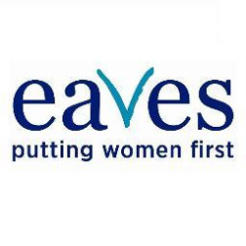Women's charity Eaves closed its doors on Friday blaming "high rents" and “abysmal commissioning” procedures for its collapse.
A statement on the charity’s website said: “It is with huge sadness that Eaves announces that it will cease operations on 30th October 2015.”
The charity has provided operational services for female victims of violence since 1977. But a funding deficit of more than £700,000, as well as depleting reserves and a "weak fundraising pipeline", caused the charity to fail, the statement said.
Some of Eaves' services have been transferred to domestic violence charity Nia, including its prostitution service 'Lea', and advocacy service 'Lilith'. The charity's Beth Centre will continue but the Trio/Lifeskillsproject and Poppy project will close, the statement said.
Chair, Louisa Cox said that Eaves “contended with high rents and project funding that does not cover the core costs" so it had "an increasing deficit”.
She also said that the recent death of chief executive Denise Marshall was a contributing factor for the charity’s failing.
“We have taken a range of measures to diversify our funding base, increase donations, cut costs, move offices, but ultimately none of these steps was enough to save us,” she said.
According to its accounts for the year ending March 2014 it had an income of £1.4m and expenditure of £1.9m. In 2011 and 2012 its income was over £6m but by 2013 it had been slashed to £2.4m.
Its accounts show the charity employed 33 people. Eleven were attached to the Poppy project, and three worked for Lifeskills project, which have closed. Seven worked for the Lilith project and one for the Beth centre which have been rescued.
'Bearing the brunt'
The charity said Eaves was just one of many women’s charities forced to close in recent years.
“Cuts, reductions and closures have of course hit a whole range of non-governmental organisations. However, there is much evidence to suggest that women are bearing the brunt,” it said.
“It is not purely and simply cuts that are at play. It is abysmal commissioning whereby commissioners either do not know or do not care what they should be looking for or how to assess a bid other than by lowest unit cost with no regard to quality.”
The charity said “large, generic, non-specialist organisations” were winning tenders, while “expanding and accumulating vast reserves”.
“Specialist, smaller organisations with 40 plus years of history with high levels of self referrals from women (a sure sign of the value of the service to the women) – are shrinking and having to use their scarce reserves to survive,” it said.
'Uncomfortable topic'
An Acevo women’s chief executive summit in September heard that large charities bidding “for someone else’s work” was wiping out the women’s sector.
Polly Neate, chief executive of Women’s Aid said: “It’s really easy for large charities to come in and take a contract because it is the acceptable face of the charity sector, compared with a woman who is an abuse survivor and who has built up services since the 1980s,” she said.
Neate said the growth ambitions of large charities was an “uncomfortable topic” for the sector in general.
“Why is it that we have allowed ourselves to get into a situation where bidding competitively for someone else’s existing work is completely unquestioned?” she said.
“It’s not only about the women’s sector – it’s about what that means for the reputation of the charity sector as a whole. People donate and give money and want to trust. But increasingly they don’t because it feels like a big business, partly because of that sort of behavior,” she said.









